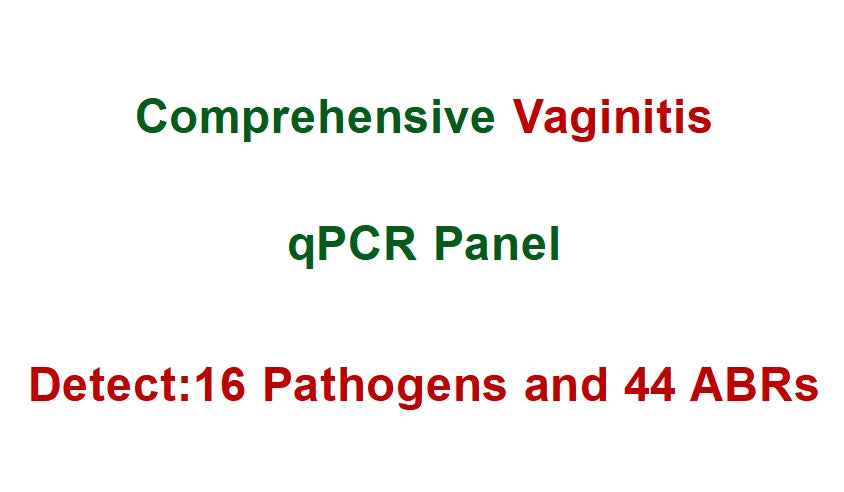Comprehensive Vaginitis qPCR Panel
Comprehensive Vaginitis qPCR Panel
无法加载取货服务可用情况
Comprehensive Vaginitis qPCR Panel
Vaginitis Overview
Bacterial or Candida-based vaginal infections are among the most common reasons women in the United States seek medical care. Statistics show that up to 75% of women will experience some form of vaginal infection during their lifetime, resulting in approximately 10 million physician office visits annually (references 1 to 4). Despite this prevalence, around 40% of women with vaginitis leave their initial medical appointment without a clear diagnosis (reference 7).
Vaginitis is primarily caused by an imbalance between protective Lactobacilli and pathogenic organisms, such as aerobic bacteria, bacterial vaginosis pathogens, and Candida species. Traditional diagnostic techniques—often microscopic—are subjective and have variable sensitivity and specificity. These limitations make it difficult to detect mixed infections accurately, potentially leading to unresolved symptoms, repeated visits, misdiagnoses, inappropriate treatments, and unnecessary healthcare costs.
Advantages of the Vaginitis qPCR Panel
The Vaginitis qPCR Panel uses a highly sensitive real-time polymerase chain reaction (PCR) assay to detect the three most common infectious pathogens and 44 antibiotic resistance (ABR) genes related to vaginitis:
-
• Bacterial vaginosis (including aerobic and enteric bacteria)
-
• Vulvovaginal candidiasis
-
• Trichomoniasis
This molecular test provides more precise results than traditional methods and enables clinicians to diagnose accurately even in cases involving mixed infections. The panel supports efficient patient care by allowing one-collection/one-test diagnosis of the most frequent vaginal infections.
In addition to pathogen identification, the panel also supports antimicrobial stewardship by reporting relevant antibiotic resistance genes. It accommodates multiple specimen types, including urine and female endocervical/vaginal swabs, and utilizes real-time PCR for fast and reliable results.
The Panel Includes
Bacteria
-
Atopobium vaginae
-
Bacterial Vaginosis-Associated Bacterium 2
-
Enterococcus faecalis
-
Gardnerella vaginalis
-
Lactobacillus gasseri
-
Lactobacillus jensenii
-
Megasphera 2
-
Mobiluncus mulieris
-
Mycoplasma hominis
-
Prevotella bivia
-
Streptococcus agalactiae
-
Ureaplasma urealyticum
Fungi & Protozoa
-
Candida glabrata
-
Candida lusitaniae
-
Candida tropicalis
Viruses
-
Herpes simplex virus 1
44 Antibiotic Resistance Genes (ABRs)
blaACC: Acinetobacter-derived cephalosporinase
blaACT: AmpC-type cephalosporinase
blaCMY: Citrobacter freundii-derived AmpC-type beta-lactamase
blaLAT: Latent AmpC-type beta-lactamase
blaFOX: Cephamycin-hydrolyzing AmpC beta-lactamase
blaGES: Guiana extended-spectrum beta-lactamase
blaMIR: Morganella morganii-inducible cephalosporinase
blaVIM: Verona integron-encoded metallo-beta-lactamase
Cfr: Chloramphenicol-florfenicol resistance methyltransferase
CMY/MOX/DHA: AmpC-type beta-lactamases (CMY, MOX, DHA families)
CTX-M_1: Cefotaximase-Munich beta-lactamase group 1
CTX-M_2: Cefotaximase-Munich beta-lactamase group 2
CTX-M_8_25: Cefotaximase-Munich beta-lactamase groups 8 and 25
CTX-M_9: Cefotaximase-Munich beta-lactamase group 9
dfrA1: Trimethoprim-resistant dihydrofolate reductase type A1
dfrA5: Trimethoprim-resistant dihydrofolate reductase type A5
ermA: Erythromycin ribosome methylation A gene
ErmB: Erythromycin ribosome methylation B gene
ErmC: Erythromycin ribosome methylation C gene
IMP-1: Imipenemase metallo-beta-lactamase type 1
IMP-2: Imipenemase metallo-beta-lactamase type 2
KPC: Klebsiella pneumoniae carbapenemase
MCR-1: Mobile colistin resistance gene 1
MecA: Methicillin resistance gene A
MecC: Methicillin resistance gene C
mefA: Macrolide efflux gene A
NDM: New Delhi metallo-beta-lactamase
OXA-48: Oxacillinase-48 carbapenemase
OXA-51: Oxacillinase-51 carbapenemase (Acinetobacter)
PER-1: Pseudomonas extended resistance beta-lactamase
qnrA: Quinolone resistance protein A
QnrB_1of4: Quinolone resistance protein B (variant 1 of 4)
QnrB_2of4: Quinolone resistance protein B (variant 2 of 4)
QnrB_3of4: Quinolone resistance protein B (variant 3 of 4)
QnrB_4of4: Quinolone resistance protein B (variant 4 of 4)
qnrS: Quinolone resistance protein S
SHV: Sulfhydryl variable beta-lactamase
Sul1: Sulfonamide resistance gene 1
Sul2: Sulfonamide resistance gene 2
Tet(M): Tetracycline resistance protein M
Tet(S): Tetracycline resistance protein S
vanA2: Vancomycin resistance gene cluster A2
vanB: Vancomycin resistance gene cluster B
VEB: Vietnamese extended-spectrum beta-lactamase
分享
files/VAG.jpg
06:31 PM


